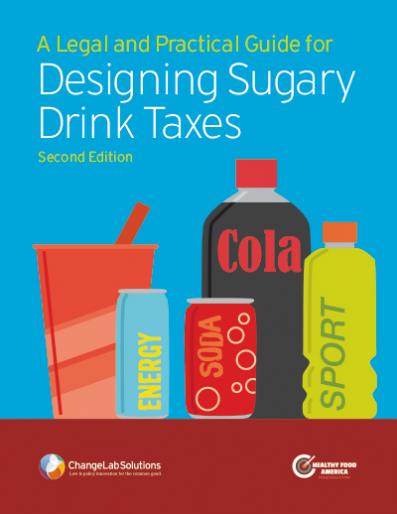Across the country and the world governments are addressing sugar-sweetened beverage consumption with sugar taxes or soda taxes The purpose of a sugar tax is to increase the cost of sugar-sweetened beverages in order to promote a decreased consumption improve nutrition and reduce obesity and chronic disease. Ii generation of substantial revenue which could be reinvested back into public health.
 Sugar Sweetened Beverage Taxation In The Region Of The Americas Paho Who Pan American Health Organization
Sugar Sweetened Beverage Taxation In The Region Of The Americas Paho Who Pan American Health Organization
And iv incentive for manufacturers to reformulate to lower-sugar products if tax is tied to the amount of sugar contained in the beverage.

Sugar sweetened beverage tax. The United Kingdom has recently joined France Hungary Chile and Mexico in introducing a SSBT. Imported sweetened beverages powders and preparations used to make beverages other than milk-based drinks and flavored and colored sugar syrups. Price elasticity of the demand for sugar sweetened beverages and soft drinks in Mexico.
The tax is reduced from 175 cents to 1 cent per fluid ounce for manufacturers with an international gross income of more than US 2 billion but less than US 5 billion. In Mexico for instance the sugar-sweetened beverage tax revenue averaged around 01 percent of GDP annually since they were instituted in 2014. To estimate changes in sugar-sweetened beverage SSB and water consumption 3 years after an SSB tax in Berkeley California relative to unexposed comparison neighborhoods.
The city of Seattle Washington passed a council vote 71 in favour of a Sweetened Beverage Tax in June to take effect in January 2018 12. Duty on SSBs raised from previous rate of 15 in 20182019 budget and from 10 in 2011. Some countries have already implemented taxes on sugar-sweetened beverages 2223 including Hungary France several states in the US and most recently Mexico where a 1 peso per litre approximately 10 tax on sugar-sweetened beverages is projected to decrease consumption by 10-12 and may have a substantial impact on reducing the.
That rate is 01 per ounce. More countries are adopting a tiered tax design which applies different tax rates depending on sugar content. Industry Response and Tactics The consumption of sugary beverages SBs has increasingly grown in many countries and is a significant contributor to the rise in obesity and non-communicable diseases NCDs.
Public health advocates say an SSBT in Australia and New Zealand could help reduce consumption of SSBs and thereby reduce obesity and other associated diseases. Iii communication of a powerful message that regular consumption of SSB is not part of a healthy diet. This announcement came against the backdrop of a growing global concern regarding obesity stemming from the overconsumption of sugar.
Filing the sweetened beverage tax. The purpose of this study is to assess the impact of the tax on the consumption of sugar-sweetened beverages in Catalonia Spain. Sugar-sweetened beverage consumption is contributing to the obesity epidemic.
Introduce a tax on sugar-sweetened beverages SSBs with effect from 1 April 2017 to help reduce excessive sugar intake. Soft earmarking can help increase public awareness and support for sugar-sweetened beverage taxes. A sugar tax is a tax on sugary drinks also called a Sugar Sweetened Beverage Tax SSBT.
There would be no tax on beverages containing less than 75 grams of sugar per 12 ounces but a tax of 1 cent per ounce on beverages containing between 75 grams and 30 grams of sugar per 12 ounces and a tax of 2 cents per ounce on beverages containing more than. Early implementers show some consistent revenue gains following the implementation of these taxes. On 28 March 2017 Catalonia enacted a law levying an excise tax on sugar-sweetened beverages for public health reasons.
About 40 countries have implemented taxes on sugar-sweetened beverages to date. Data came from repeated annual cross-sectional beverage frequency questionnaires from 2014 to 2017 in demographically diverse Berkeley n 1513 and comparison San Francisco and Oakland. In effect since September 16 2017 the Thai Excise Department implemented for first time ever an excise sugar tax on certain beverages to reduce consumption of sugar and to increase health consciousness.
The intended benefits of an SSB tax are fourfold. The standard tax rate for the sweetened beverage tax is 0175 per ounce. A few Middle Eastern countries eg Saudi Arabia Qatar and the United Arab Emirates have instituted 50 to 100 excise taxes on subsets of SSBs 29 and Bermuda has implemented a 75 import tax on sugar SSBs and candies 30.
Distributors are liable for the sweetened beverage tax on distributions of sweetened beverages into. In March 2015 Berkeley California implemented a penny per ounce tax on sugar sweetened beverages the first city-level tax in the nation 29 10. There is a reduced tax rate for certified manufacturers.
These countries are listed below with details including the implementation date and type of tax used. I an increase in the retail price of SSB would reduce consumption and produce public health benefits.